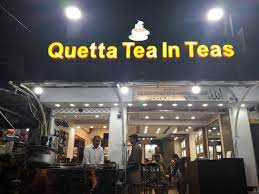
Article by
The dry and tough lands of Balochistan have faced many tough times due to droughts, affecting not only the land but also how people live. One interesting thing that has happened is the rise of Quetta Cafes (QCs) in Rawalpindi and Islamabad, and it's connected to the history of droughts in Balochistan. This shows us how environmental problems can bring about changes in society.
Balochistan has a history of facing droughts, with 18 recorded between 1950 and 2010. The worst one lasted for ten years from 1945 to 1955. The latest dry period from 1997 to 2003 caused inflation, lack of food, and many people moving from rural areas to cities, especially Karachi. This migration laid the foundation for Quetta Cafes.
At first, people moving from Balochistan to Karachi started Quetta hotels, which then spread across the city. But conflicts between different communities in Karachi, like the Mohajirs and Pashtuns, made many Pashtun traders leave their businesses and find new homes in other cities. This big move led Quetta Cafes to grow in Rawalpindi and Islamabad, becoming important places for the public.
Cafes, like those described by Habermas, play a crucial role in encouraging public conversations. In today's world, they've become places to socialize and connect—a third space between home and work/study. In South Asia, especially in Quetta Cafes in Rawalpindi and Islamabad, tea has become a social staple, bringing people together.
Tea is more than just a beverage in Pakistani culture; it symbolizes hospitality and friendship. Quetta Cafes, with their unique red decor and Boss company chairs, play a significant role in the tea culture of these twin cities. Affordable and welcoming, tea has become an essential part of social gatherings, highlighting the importance of Quetta Cafes as public meeting spots.
If we take a closer look at Quetta Cafes, exploring how they provide employment and entrepreneurship opportunities. Their distinctive economic model, with single-shop setups and shared kitchens, reflects simplicity and efficiency. The recognizable red decor and uniform utensils contribute to their success, creating a unique brand identity.
Quetta Cafes play a vital role in the social fabric, they face transaction costs triggered by regulatory bodies. Pakistan Institute of Development Economics study sheds light on the challenges these cafes encounter in navigating regulatory frameworks. Understanding and addressing these transaction costs are crucial for the sustainable growth of Quetta Cafes in Rawalpindi and Islamabad.
The economic impact of Quetta Cafes extends beyond their role as public spaces. These cafes have become pillars of local economies, providing employment opportunities to a significant number of individuals. Owners, managers, and workers contribute collectively to the success of these establishments, adding a layer of economic resilience to the communities they serve. The cafes' simplicity in operation and focus on a single product, tea, allows for a streamlined business model that facilitates local economic growth.
Quetta Cafes play a crucial role in preserving and promoting Pakistan's rich tea culture. These cafes serve not only as spaces for refreshment but also as guardians of cultural practices, acting as contemporary custodians of a time-honored tradition.
As spaces for public discourse, Quetta Cafes hold immense significance in shaping public opinion. The relaxed atmosphere and affordability of these cafes make them accessible to people from various walks of life. Students, business professionals, and tea enthusiasts converge in these spaces, fostering a diverse and inclusive environment where conversations flow freely. In an era dominated by digital communication, these physical spaces remain invaluable for face-to-face interactions and the exchange of ideas.
Despite their cultural and economic contributions, Quetta Cafes face challenges, particularly in dealing with transaction costs imposed by regulatory bodies. Navigating through bureaucratic hurdles can pose a threat to their sustainability. However, the resilience displayed by these cafes in the face of adversities mirrors the resilience of the communities they represent. Efforts to address these challenges are vital to ensuring the continued success and growth of Quetta Cafes as integral components of the social fabric.
Looking ahead, the future prospects of Quetta Cafes are intertwined with community integration and continued adaptation to evolving circumstances. These cafes have evolved from being mere tea spots to becoming cultural landmarks, and their sustainability hinges on their ability to stay connected with the communities they serve. Initiatives that foster community engagement, support entrepreneurship, and address regulatory challenges will play a pivotal role in shaping the trajectory of Quetta Cafes in Rawalpindi and Islamabad.
As symbols of Pakistan's tea culture, Quetta Cafes have transcended their role as mere refreshment spots to become integral elements of societal interaction, economic vitality, and cultural heritage. In sipping a cup of tea at a Quetta Cafe, one partakes in a tradition that has weathered the tests of time, a tradition that brews not just tea but a shared sense of belonging and identity.
 Monthly "Azeem English Magazine", launched in 2000, records the information about diverse fields like mental health, literature, research, science, and art. The magazine's objective is to impart social, cultural, and literary values to society.
Monthly "Azeem English Magazine", launched in 2000, records the information about diverse fields like mental health, literature, research, science, and art. The magazine's objective is to impart social, cultural, and literary values to society.
+92 51 88 93 092
First Floor, RAS Arcade, Eidhi Market, Street#124, G-13/4, Islamabad, Pakistan, 44000.